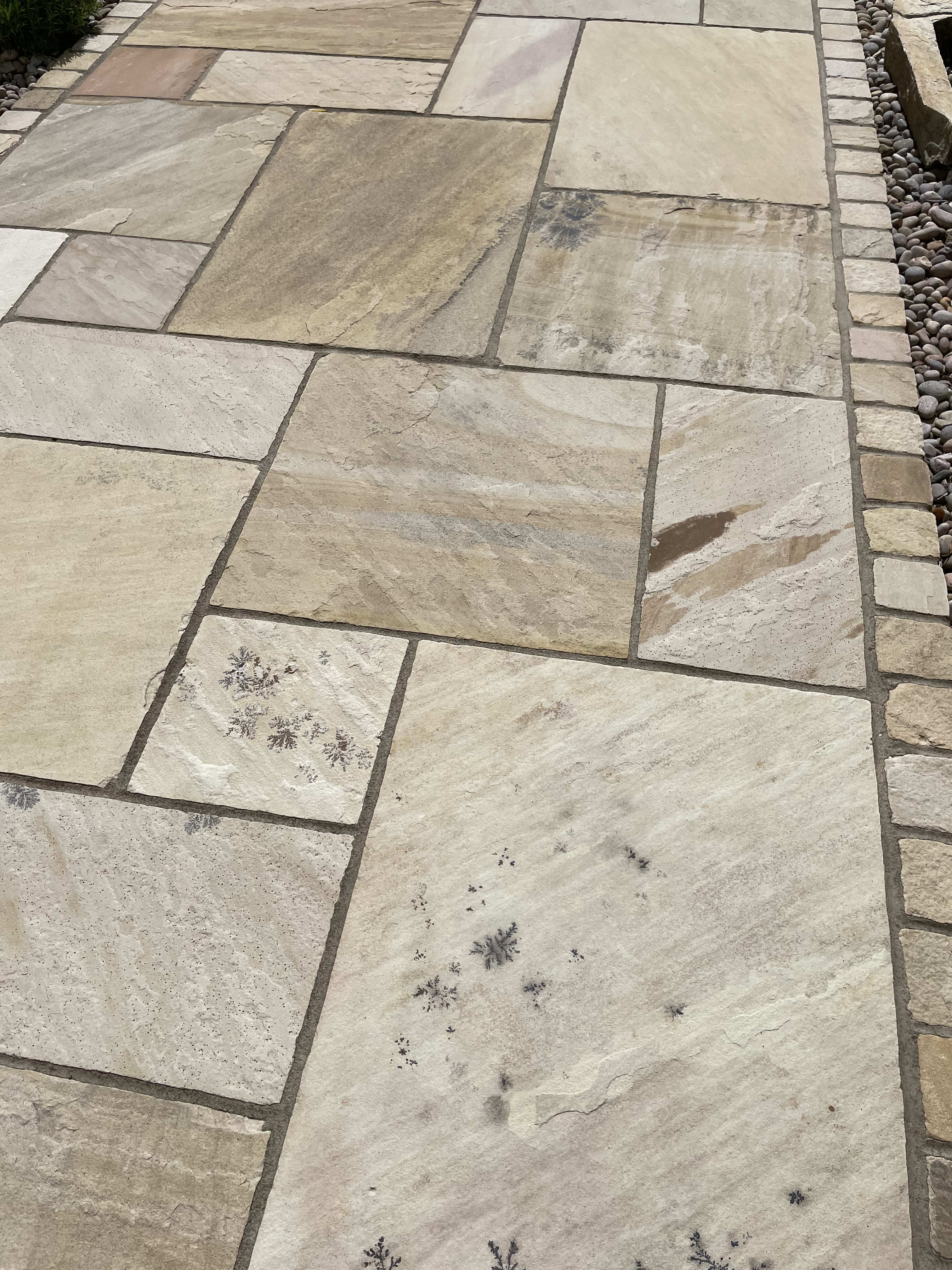Indian Sandstone Slabs
(14 Products)Indian sandstone paving slabs are a popular choice for both residential and commercial landscaping projects due to their beauty, durability, and affordability. This natural stone is sourced from quarries in India and is known for its stunning range of colours and patterns, making it an ideal option for creating unique and visually appealing outdoor spaces.
What Are Indian Sandstone Slabs?
Indian Sandstone slabs are natural stone paving materials that are quarried and sourced from various regions in India, known for their abundant and high-quality sandstone deposits.
Indian sandstone slabs are popular in landscaping and construction for their unique aesthetic appeal, durability, and versatility.
Sandstone patios, with their stunning natural colours, veining and tonal diversity, radiate a magnificent array of hues - in fact, each and every sandstone patio is unique - no two slabs are the exact same.
On beautiful summer days, sandstone tends to display light shades while after rainfall the colours transform into an exquisite patina.
Ultimately, this tonal variation will depend on the colour you opt for. With so many different colours on the market from Raj Green and Fossil Mint to Autumn Brown, there is an abundance of aesthetic possibilities.
We stock a wide range of paving solutions to cater to your paving needs - check them out on our Driveway & Paving homepage.
Available Indian Sandstone Slab Colours
- Raj Blend
- Kandla Grey
- Camel Buff
- Mint Indian
- Autumn Brown
Benefits of Indian Stone Paving Slabs
- Durability: Indian stone slabs are highly durable and can withstand heavy foot traffic, harsh weather conditions, and the test of time. They are also resistant to fading, which ensures that your outdoor space will look beautiful for years to come.
- Versatility: Indian sandstone paving comes in a wide range of colours and tonal variations, making it a versatile option for any landscaping project. Whether you want to create a traditional, rustic look or a modern, sleek design, Indian sandstone paving can accommodate your style preferences.
- Cost-effective: Indian sandstone paving is a cost-effective option compared to other natural stones like granite or marble. It offers similar durability and beauty at a lower price point, making it a popular choice for those looking for a high-quality, affordable landscaping solution.
- Easy to maintain: Indian sandstone paving is relatively low-maintenance, making it a great choice for those who don't want to spend a lot of time and money on upkeep. Regular cleaning and sealing can help prolong the life of your sandstone paving and keep it looking its best.
Uses of Indian Sandstone Paving
Indian sandstone paving is versatile and can be used in a variety of landscaping projects, including:
- Patios: Indian sandstone paving is an excellent option for creating beautiful, durable patios that can withstand heavy foot traffic and harsh weather conditions.
- Pathways: Indian sandstone paving is a popular choice for creating natural-looking pathways that blend seamlessly into the surrounding landscape.
- Driveways: Indian sandstone paving is a durable and cost-effective option for creating driveways that can withstand the weight of vehicles and regular use.
- Garden features: Indian sandstone paving can be used to create beautiful garden features such as walls, steps, and water features that enhance the overall aesthetic of your outdoor space.
Maintenance of Indian Sandstone Paving
To keep your Indian sandstone paving looking beautiful and durable, regular maintenance is essential. Here are some tips for maintaining your sandstone paving:
- Clean your sandstone paving regularly using a pressure washer or a mild cleaning solution and a soft-bristled brush.
- Remove any stains or marks from your sandstone paving using a specialized stain remover.
- Seal your sandstone paving regularly to protect it from weather damage, fading, and general wear and tear.
- Address any damage or cracks to your sandstone paving immediately to prevent further deterioration.
Frequently Asked Indian Sandstone Paving Questions
Where Do Indian Sandstone Slabs Come From?
Indian sandstone is a type of sedimentary rock that is formed from the accumulation and hardening of sand, clay, and other organic materials over millions of years. It is quarried in different parts of India, including Rajasthan, Gujarat, and Madhya Pradesh.
Not to be mistaken for natural stone paving, Indian sandstone is prized for its natural beauty and is available in a range of colours, including shades of beige, kandla grey (a subtle blend of grey tones), light grey, yellow, and pink.
What Is The Difference Between Riven and Sawn & Honed?
The riven surface of sandstone paving is a result of natural splitting along its layers, which imparts an authentic finish. This process gives rise to exquisite variations in texture across each slab, making each paver unique.
Sawn and honed, on the other hand, is a process which sees all six sides of a slab cut with pinpoint precision to the nearest millimetre via machine sawing. The surface is then further buffed and honed, giving it a smooth matte finish that beautifully complements modern landscaping designs.
Is Indian Sandstone Ethically Sourced?
Unfortunately, many people in Great Britain consider the production of Indian Sandstone Paving to be unethical. Rumours suggest that those working on these projects are subjected to child labour and receive low wages while having to endure dangerous conditions.
Here at Materials Market, we ensure that all of our high-quality sandstone paving slabs are ethically sourced so you can build in good conscience.
What Is Calibrated Indian Sandstone Paving?
The term "calibrated" in calibrated Indian sandstone refers to a cutting technique which ensures consistent thickness throughout slabs.
Calibrated Indian sandstone paving slabs are a favoured option among landscapers due to their uniform cut - a property which ensures effortless laying and ease of transportation. Typically, sandstone paving slabs have a standard calibrated thickness of 22mm, although this may vary for hand-cut and uncalibrated sandstone garden tiles.

.jpg)
.jpg)

.jpg)





.jpg)




